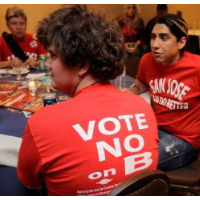San Jose Pension Scare that Fueled Ballot Benefits Rollback Is Unsupported by Facts
 Election night June 5, 2012, in San Jose. (photo: Paul Sakuma, Associated Press)
Election night June 5, 2012, in San Jose. (photo: Paul Sakuma, Associated Press)
When San Jose voters overwhelmingly approved Measure B on the ballot in June, they had been told that unless pension costs were reined in immediately taxpayers would be on the hook for $650 million by 2015.
The California State Auditor now says that number is “unsupported and likely overstated.”
The $650 million figure first surfaced in February 2011 when the city’s retirement director told the city council that he projected a $400 million obligation by 2015 but that more conservative assumptions would raise that figure $250 million. The auditor said those figures were formulated without input from the boards that oversaw its two independent retirement plans and “not supported” by appropriate documentation.
The auditor said a more accurate figure would be $320 million, an estimate reached by the retirement boards whose members include city employees, retirees and finance experts.
Union leaders, locked in negotiations with the city over pension reform, sued to block Measure B after its passage. John Mukhar, president of a city union representing architects and engineers, told the San Jose Mercury News that, “The mayor's political strategy of overinflating costs proved to be the largest barrier in negotiating legal pension reform with San Jose's employees.’
Measure B limits retirement benefits for new hires and requires current employees to either pay up to 16% more for their pension plan or switch to one that isn’t as generous. It also would let the city temporarily suspend cost-of-living pension increases for retirees in a fiscal emergency.
The duel over pensions is one that is being played out across the state as the economic downturn has thrown local budgets and state finances into disarray. Labor agreements that seemed reasonable a few years ago look more burdensome today. Governor Jerry Brown has supported rollbacks of public employee pensions, including proposals that workers pay for half the cost of their retirement instead of the current 8% and switch to hybrid plans that incorporate market-based 401Ks.
Critics of pension reform argue that legitimate concerns about unsustainable retirement are being subverted by political partisans looking for an excuse to reduce the power of organized labor, a strong Democratic Party constituency.
They also allege that economic analysis of the financial problems are being manipulated, as evidenced by the state auditor’s San Jose report, to exaggerate the problem, obscure potential solutions and scare the public.
–Ken Broder
To Learn More:
State Auditor Calls San Jose Pension Estimates “Unsupported” (by John Woolfolk, San Jose Mercury News)
City of San Jose: Some Retirement Cost Projections Were Unsupported although Rising Retirement Costs Have Led to Reduced City Services (California State Auditor) (pdf)
Measure B: Who's Really Behind the Money? (by Jenna Susko, Felipe Escamilla and Kevin Nious, NBC Bay Area)
- Top Stories
- Controversies
- Where is the Money Going?
- California and the Nation
- Appointments and Resignations
- Unusual News
- Latest News
- California Forbids U.S. Immigration Agents from Pretending to be Police
- California Lawmakers Urged to Strip “Self-Dealing” Tax Board of Its Duties
- Big Oil’s Grip on California
- Santa Cruz Police See Homeland Security Betrayal in Use of Gang Roundup as Cover for Immigration Raid
- Oil Companies Face Deadline to Stop Polluting California Groundwater





